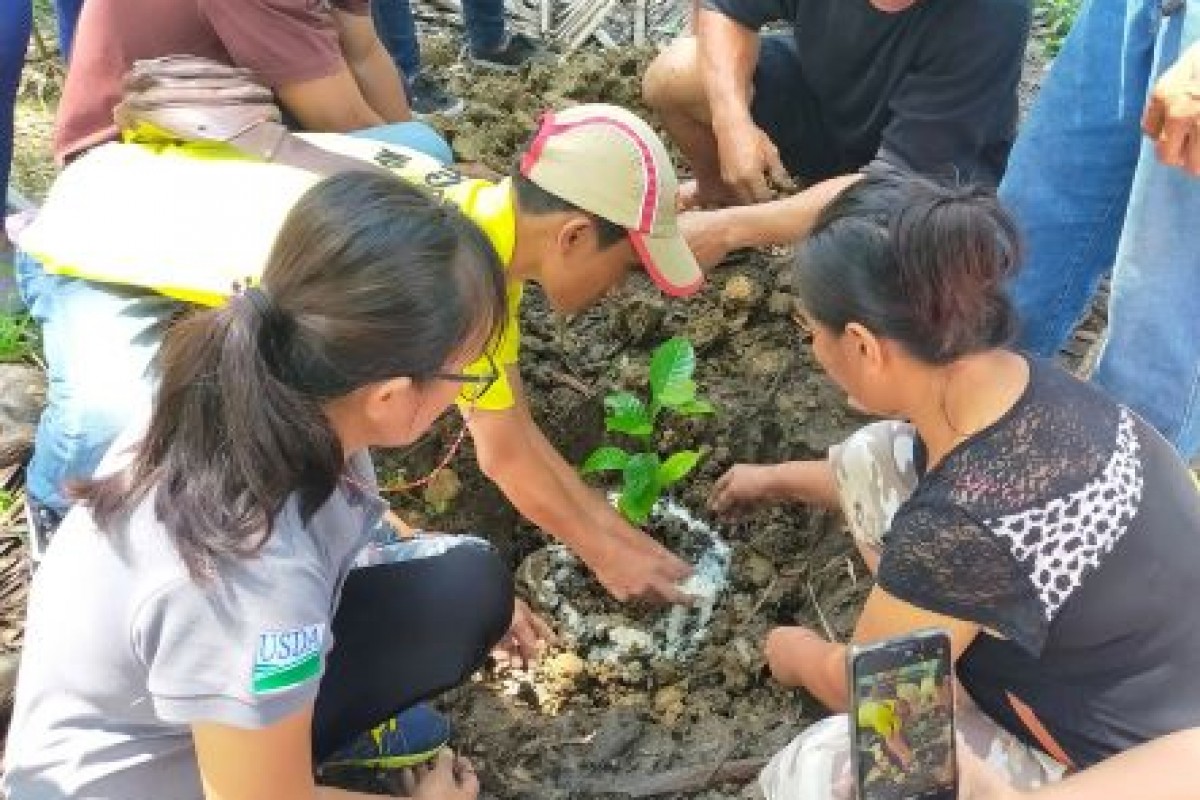
To capacitate the Sarangani coffee farmers on good agricultural practices and as a way to encourage them to produce quality coffee beans, the Sarangani Coffee Industry Development Council in collaboration with United States Agency for International Development (USAID) and Philippine Coffee Advancement and Farm Enterprise (PhilCAFE) conducted a 2-day “Training on Coffee Integrated Pest and Diseases Management with Pruning and Rejuvenation Techniques among people’s organizations of Malungon and Eastern Sarangani Watershed" from August 18-19, 2022 in Barangay Lower Mainit, Malungon, Sarangani Province.
Coffee farmers from Malungon, Alabel, Malapatan and Glan participated in this coffee training that also helped motivate them to take care of their watershed areas in their respective communities.
Coffee training senior field technician Novelyn Valerio from the ACDI/VOCA-PhilCAFE Project was their resource person who taught them organic agricultural methods for coffee farming with field practicum.
“This activity aims to cascade and train coffee farmers to produce quality agricultural products. It should start on selecting quality planting materials for good production and high yields,” Valerio said.
The training also incorporates Integrated Pest Management approach that promotes organic method to keep the water sources safe in their areas. They were also taught the proper way of coffee tree pruning and rejuvenation techniques.
Pruning helps improve the health and yield of coffee plants. While coffee rejuvenation is among the universally-known best practices to enhance coffee production, cutting of vertical branches and stems of old trees also stimulates sprouting of new branches.
Valerio said that this kind of activity not only boosts production but it also assures farmers of increased income while protecting their environment.
Their field practicum includes identification of pests and diseases in the coffee farm; pruning of unwanted stems and branches; rejuvenation of old and unproductive coffee trees; and tree crop management.
“This training encourages our local coffee farmers to produce quality coffee beans that they could sell on a higher price,” Sarangani Coffee Industry Development Council Chairperson Renny Boy Takyawan said.
“We plan to roll out this kind of training to different barangays and sitios in Sarangani to help our farmers learn sustainable agricultural methods, farm management and market linkage. We aim for Sarangani coffee to be known in the country and abroad,” he added.

The Sarangani Coffee Council encourages local farmers to plant more coffee trees because of its high demand in both local and international markets. Despite its recent progress, the Philippine coffee sector remains in need of support to become competitive and profitable for coffee farmers throughout the country.
That is why PhilCAFE is boosting the production of conventional and specialty coffee and coffee exports from the Philippines. PhilCAFE is an activity funded by the U.S. Department of Agriculture (USDA) and implemented by ACDI/VOCA.
The USAID Safe Water project also supports small coffee farmers in the country through the provision of technical assistance and training programs; improvement of farmer’s capacity to produce and market high quality coffee; improvement of access to finance, markets and farm inputs, among others.
Sarangani is the first province in the Philippines to implement the Safe Water project. The USAID signed a five-year, P869 million Memorandum of Understanding (MOU) with Palawan, Negros Occidental, and Sarangani to address the water security challenges faced by communities in these provinces.
USAID provides technical assistance to help these provinces gain reliable access to clean water. The project started in 2020 and will end in 2024.
The Safe Water project also collaborates with private sectors and non-government organizations to empower communities to become better environmental stewards, builds local capacity to deliver clean drinking water and improved sanitation services, and strengthens stakeholder engagement toward a long-term water security. (Genory Vanz Alfasain/Sarangani Chambers of Commerce and Industry, Inc.)




